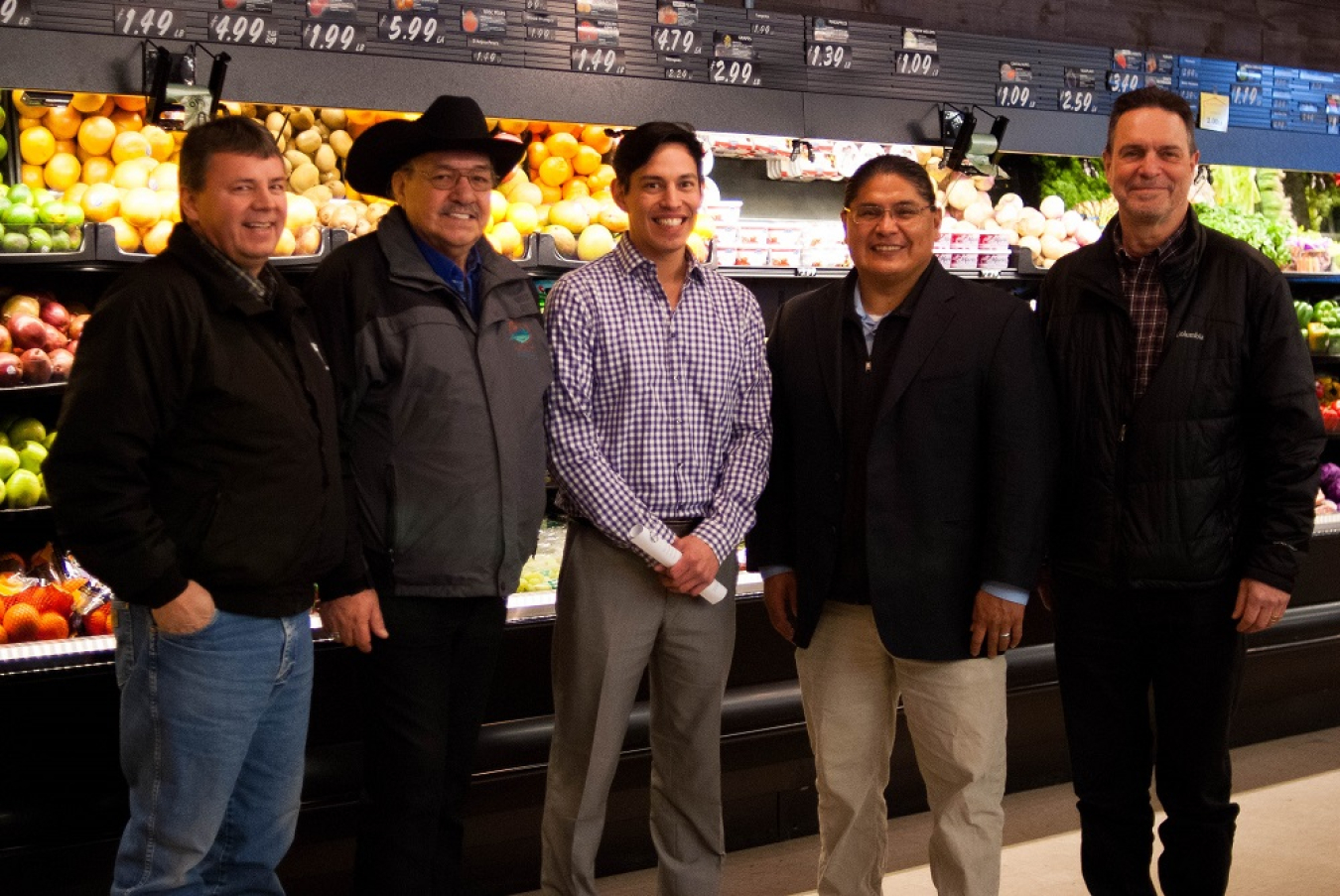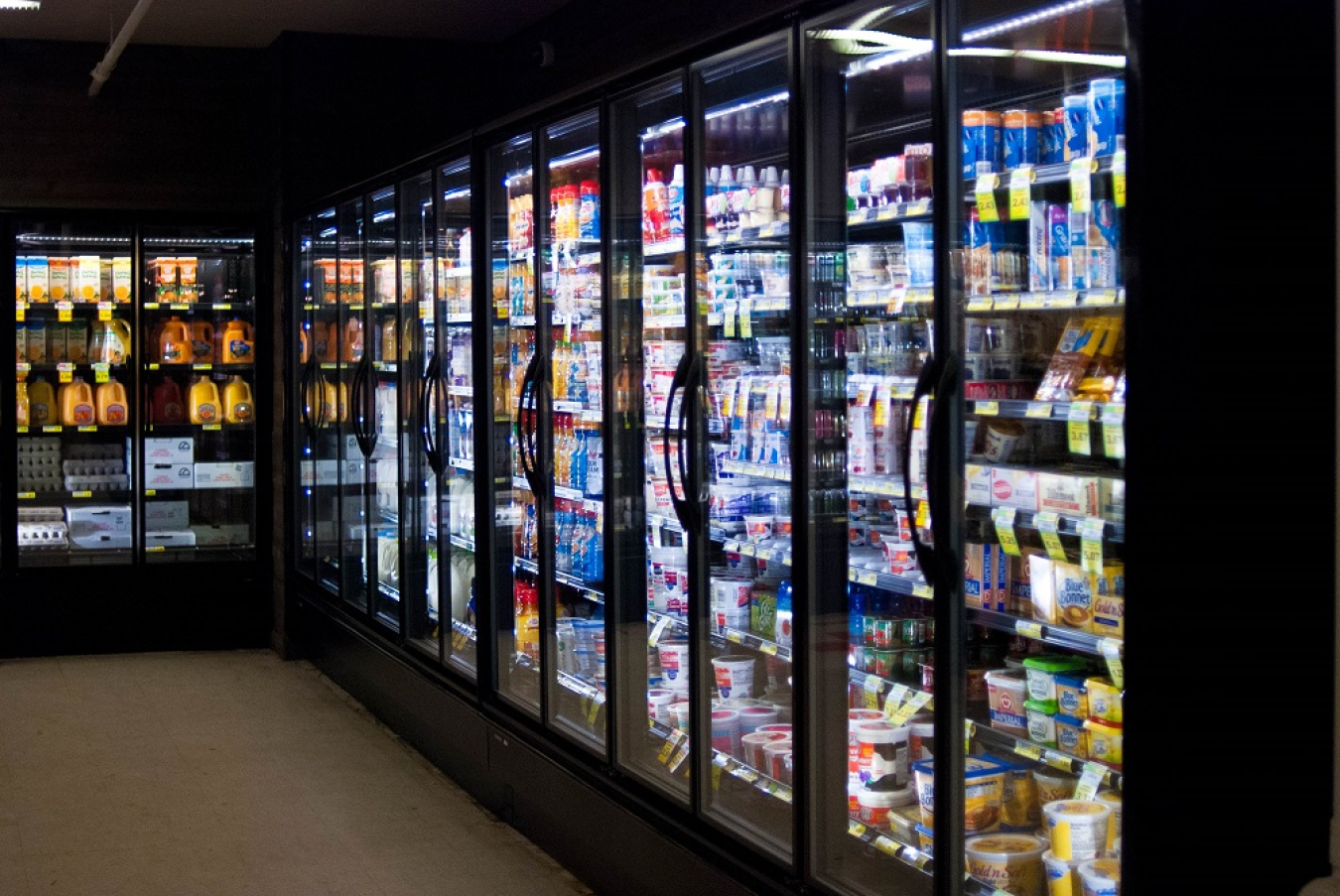On Feb. 28, 2017, the Coeur d'Alene Tribe held a ribbon-cutting ceremony to celebrate the successful retrofit of its Benewah Market in Plummer, Idaho.
Office of Indian Energy Policy and Programs
March 31, 2017
On Feb. 28, 2017, Office of Indian Energy Director Chris Deschene (second from right) joined the Coeur d'Alene Tribe to celebrate its upgraded Benewah Market in Plummer, Idaho. From left: Joe Peone (Bonneville Power Administration), Alfred M. Nomee (Coeur d’Alene Tribe), James Alexie (Coeur d’Alene Tribe), Chris Deschene, and Ken Johnston (Bonneville Power Administration). Photo from Jennifer Fletcher, Coeur d'Alene Tribe Council Fires Newspaper

The new, more efficient refrigeration units, compressors, and evaporators installed at the Benewah Market could reduce the store's energy usage by up to 45%—meaning projected cost savings of more than $16,065 per year for the Coeur d'Alene Tribe. Photo from Jennifer Fletcher, Coeur d'Alene Tribe Council Fires Newspaper
On Feb. 28, 2017, the Coeur d'Alene Tribe held a ribbon-cutting ceremony to celebrate the successful retrofit of its Benewah Market in Plummer, Idaho. The tribally owned and operated grocery store received 15 energy efficiency upgrades, including replacing outdated compressors, evaporators, and refrigeration units with new, more efficient equipment. The project was cofunded by a U.S. Department of Energy (DOE) Office of Indian Energy Deployment Program grant competitively awarded to the Tribe in 2014.
A DOE-funded energy efficiency feasibility study laid the foundation for this project in 2011, when the Tribe assessed 36 of its tribally owned and operated facilities for energy savings opportunities. The study found the Benewah Market to be severely lacking in modern, energy-efficient equipment and systems such as lighting fixtures, coolers and freezers, display cases, cooling and heating systems, ovens, fryers, and grills. The study also found that energy savings of more than 30% were possible. As a result of the assessment, the Coeur d'Alene Tribe deemed the Benewah Market its top priority for implementing facility energy performance improvements in support of the Tribe's energy efficiency and conservation goals.
"The more the Tribe can reduce its energy use and energy costs, and the more the Tribe can reduce its carbon footprint, the closer the Tribe gets toward sustainability," said Tiffany Allgood, Environmental Action Plan Coordinator for the Coeur d'Alene Tribe.
The Benewah Market is a 23,500-square-foot, single-story facility, the majority of which is occupied by a grocery store with a full meat department, deli, and bakery, with the rest of the space occupied by a hardware retailer. The store is the largest full-service market serving the Coeur d'Alene Reservation—and is the only full service market in a 35-mile radius.
Through this project, the Tribe expects to decrease the market's energy use by at least 30.8% and possibly as much as 45%—meaning energy costs for the facility will drop by at least $16,065 annually. And the benefits don't stop there: the Tribe also expects the upgrades will increase the health and safety of the perishable food sold at the market, decrease operations and maintenance costs, provide jobs to bolster the local economy, and boost the market's economic viability.
"The Benewah Market's sales have increased recently, and the Tribe believes it is in large part due to the new refrigeration equipment. The fact that the equipment is new and very sleek-looking, the products are more visible and displayed so well, and do not have any frost on them, increases the public's confidence in the products," Allgood said. "These sales increases, as well as the decrease in energy use and maintenance costs, mean that the tribal market is able to profit and reinvest that profit back into the community."
For more information on the project, read the December 2016 project status report the Tribe presented at last year's Tribal Energy Program Review.

